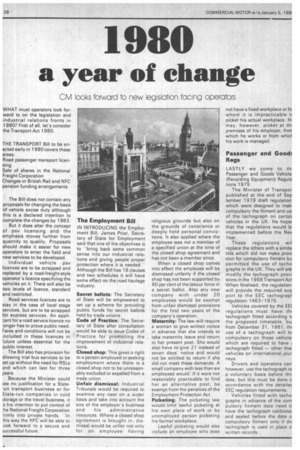1980
Page 38

If you've noticed an error in this article please click here to report it so we can fix it.
a year of change
CV looks forward to new legislation facing operators
WHAT must operators look forward to on the legislation and industrial relations fronts in 1980? First of all, let's consider the Transport Act 1980.
THE TRANSPORT Bill to be enacted early in 1980 covers these areas: Road passenger transport licensing Sale of shares in the National Freight Corporation Changes in British Rail and NFC pension funding arrangements The Bill does not contain any proposals for changing the basis of vehicle excise duty although this is a declared intention to complete the changes by 1983.
But it does alter the concept of psv licensing and the emphasis moves further from quantity to quality. Proposals should make it easier for new operators to enter the field and new services to be developed.
Individual vehicle psv licences are to be scrapped and replaced by a road-freight-style operator's licence specifying the vehicles on it. There will also be two levels of licence, standard and restricted.
Road services licences are to stay in the case of local stage services, but are to be scrapped for express services. An applicant for a road service licence no onger has to prove public need. Fares and conditions will not be Included in these licences in uture unless essential for the public interest.
The Bill also has provision for 31lowing trial bus services to be set up without the need for RSLs 3nd which can last for three jears.
Because the Minister could see no justification for a State:un transport business or for State-run companies in cold storage or the travel business, it s his intention to put control of :he National Freight Corporation 'irmly into private hands. "In :his way the NFC will be able to ook forward to a secure and successful future.'
The Employment Bill IN INTRODUCING the Employment Bill, James Prior, Secretary of State for Employment said that one of the objectives is to -bring back some common sense into our industrial relations and giving people proper protection where it is needed.Although the Bill has 18 clauses and two schedules it will have some effect on the road haulage industry.
Secret ballots: The Secretary of State will be empowered to set up a scheme for providing public funds for secret ballots held by trade unions.
Code of Practice: The Secretary of State after consultation would be able to issue Codes of Practice for promoting the improvement of industrial relations.
Closed shop: This gives a right to a person employed or seeking employment where there is a closed shop not to be unreasonably excluded or expelled from a trade union.
Unfair dismissal: Industrial Tribunals would be required to examine any case on a wider basis and take into account the size of the employer's business and his administrative resources. Where a closed shop agreement is brought in, dismissal would be unfair not only for an employee having religious grounds but also on the grounds of conscience or deeply held personal convictions. It also applied where the employee was not a member of a specified union at the time of the closed shop agreement and has not been a member since.
When a closed shop comes into effect the employee will be dismissed unfairly if the closed shop has not been supported by 80 per cent of the labour force in a secret ballot. Also any new company with under 20 employees would be exempt from unfair dismissal provisions for the first two years of the company's operation.
Maternity: The law will require a woman to give written notice in advance that she intends to take maternity leave and return to her present post. She would also have to give 21 instead of seven days' notice and would not be entitled to return if she did not meet these demands. A small company with less than six employees would; if it were not reasonably practicable to find her an alternative post, be exempt from the penalties of the Employment Protection Act.
Picketing: The picketing law would limit lawful picketing at his own place of work or by unemployed person picketing his former workplace.
Lawful picketing would also include an employee who does not have a fixed workplace or fo whom it is impracticable t( picket his actual workplace. may, however, picket at thi premises of his employer, fron which he works or from whicl his work is managed.
Passenger and Goodl Regs
LASTLY we come to th Passenger and Goods Vehicle (Recording Equipment) Regula tions 1979.
The Minister of Transpor published at the end of Sep tember 1979 draft regulation which were designed to mak compulsory the fitment and us, of the tachograph on certaii vehicles in the UK. He hope( that the regulations would bi implemented before the Nev Year.
These regulations wil replace the others with a simila title which did not make provi sion for compulsory fitment bu permitted the use of tacho graphs in the UK. They will alS.1 modify the tachograph provi sions in the 1968 Transport Act When finalised, the regulation will provide the required sup port to the EEC tachograpl regulation 1463/ 1970.
Vehicles covered by the EE( regulations must have thi tachograph fitted according t( the proposed timetable, bu from December 31, 1981, thi use of a tachograph will ID( compulsory on those vehicle: which are required to have i tachograph fitted — other thar vehicles on international jour neys.
Drivers and operators can however, use the tachograph or a voluntary basis before thi: date, but this must be done ir accordance with the detailec EEC regulation requirements.
Vehicles fitted with tacho graphs in advance of the corn pulsory fitment date need have the tachograph calibrate( and sealed before the date o compulsory fitment only if thi tachograph is used in place o written records.
















































































